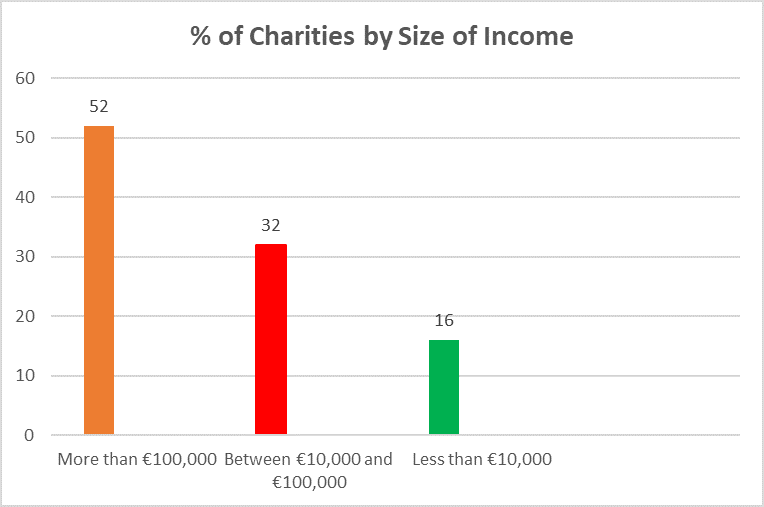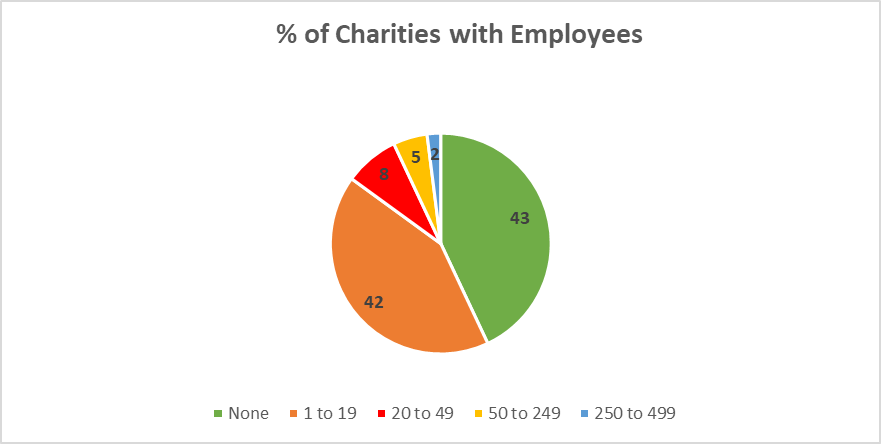
by John McCarthy Consulting Ltd. | Sep 13, 2020 | Blog, News
Charities Regulator Report by the Numbers
As we saw in last weeks’ blog there is a wide variety of charity on the Register of Charities in Ireland.
This week we look at the percentage of charities by income and numbers of employees.
Charities by Income

52% of charities had annual income of more than €100,000, 32% had annual income of between €10,000 and €100,000 while there was a sizeable 16% of charities with income per annum of less than €10,000.
Within the 2,165 charities reporting an annual income of over €250,000 in 2019, 875 (40%) had income in excess of €1 million.
Charities by Employee Numbers

43% of charities had no employees. 42% reported having between 1-19 employees, 8% had between 20-49, 5% had 50-249, while 2% had between 250-499.
The 2019 Charities Regulator Annual Report can be found here.
Our Charity Accounting and Charity Audit webinars are available here for immediate access and come with much support material as an extra free bonus.
We also have several audit template letters for charities that are up to date for FRS 102 SORP, GDPR and Coronavirus (COVID-19) downloadable for immediate tailoring in MS Word.
For a full list of all our webinar recordings, please go to our webinar site here. They may be viewed at any time for 12 months after the date of purchase.
We also have a complete set of charities letters of representation in our publications store, updated for SORP and Coronavirus (COVID-19), and letters of engagement for immediate download here. There are also versions available for charities not yet implementing the SORP.

by John McCarthy Consulting Ltd. | Sep 7, 2020 | Blog, News
Charities Regulator Report
The number of charities registered in Ireland passed the 10,000 mark in 2019 (the actual number was 10,514), according to the Charities Regulator which published its annual report in July 2020.
The Register of Charities
The 10,514 charities on the public Register of Charities at the end of 2019 is an increase of 715 (7%) on 2018. There were 67,129 charity trustees on the Register of Charities at 31 December 2019, up 10% on the previous year. Charity trustees include committee members and company directors who ultimately exercise control and have legal responsibility for running charities.
Points of note from the 2019 Annual Report are:
The most common charitable purposes of registered charities in 2019 were:
- Benefit to the community 54%,
- Advancement of education 30%
- Relief of poverty/economic hardship 9%
- Religion 7%
Breakdown of charities
- Incorporated companies 44%
- Unincorporated entities:
- Associations 15%
- Boards of Management (Schools/other) 27%
- Other 8%
- Charitable Trusts 6%
The full list of the Irish registered Charities can be accessed here on the Register of Charities:
The 2019 Charities Regulator Annual Report can be found here
Our Charity Accounting and Charity Audit webinars are available here for immediate access and come with much support material as an extra free bonus.
We also have several audit template letters for charities that are up to date for SORP, GDPR and Coronavirus (COVID-19) downloadable for immediate tailoring in MS Word.
For a full list of all our webinar recordings, please go to our webinar site here. They may be viewed at any time for 12 months after the date of purchase.
We also have a complete set of charities letters of representation in our publications store, updated for SORP and Coronavirus (COVID-19), and letters of engagement for immediate download here. There are also versions available for charities not yet implementing the SORP.

by John McCarthy Consulting Ltd. | Aug 29, 2020 | Blog, News
How is your AML Compliance?
In last week’s blog we wrote about the recent publication of the 2019 Annual Report of the Chartered Accountants Regulatory Board (CARB). The section on Money Laundering inspections will be of interest to readers.
Money Laundering Compliance Review – Every firm is required to perform an annual money laundering compliance review and document it, with findings for follow-up action. The review should involve a thorough examination of the firm’s AML procedures, including their application on client files, a review of the firm’s AML Policies & Procedures Manual and a review of AML training within the firm. Firms are also required to have prepared and documented a Firm Wide Business Risk Assessment.
During any subsequent Institute inspection the remedial action, identified in the firm’s review, will be expected to have been completed or substantially progressed.
AML Training – Firms must have procedures to monitor that all personnel involved in client work (not just client facing staff) receive up to date AML training.
Annual Return declarations – Firms must complete their annual returns every year. Often the AML section has errors. The Quality Assurance Committee of the Institute, to which the Professional Standard Department reports, takes incorrect declarations on the Annual Return very seriously and regulatory penalties can result where inaccuracies are identified during an inspection.
Our February 2020 up to date AML Policies & Procedures Manual is available on our site for immediate download in Word format and it contains everything you need to be up to date.
We also have several audit template letters that are up to date for GDPR and Coronavirus (COVID-19) downloadable for immediate tailoring in MS Word.
For a full list of all our webinar recordings, please go to our webinar site here. They may be viewed at any time for 12 months after the date of purchase.
We also have a complete set of letters of representation in our publications store, updated for Coronavirus (COVID-19), and letters of engagement for immediate download here.

by John McCarthy Consulting Ltd. | Nov 22, 2017 | News
The new Companies (Accounting) Act, 2017 came into effect from 9 June 2017. It has brought with it, some strange consequences for micro-companies, in particular.
The Act brings into law a new accounting standard for measurement and presentation called FRS 105.
This essentially new accounting framework, among other things, will mean that certain qualifying ‘micro’ companies will not have to disclose details of directors’ remuneration, profit and loss account or include a director’s report in their filed financial accounts. Importantly the standard is not available to charities and not for profit entities and regulated entities. It cannot be used by groups and cannot be used if the micro-entity is being consolidated.
Another issue that arises, is that financial statements prepared under FRS 105 are deemed to automatically give a ‘true and fair view’ without the addition of further explanatory notes beyond those set out in company law, under the Companies (Accounting) Act, 2017. FRS 105 is therefore deemed to be a ‘compliance framework’ and not a ‘fair presentation’ framework (as FRS 102 is). Letters of engagement and representation with clients, using FRS 105, will need amended to make this point clear. Amended letters are available by contacting us here.
Let’s explain these two types of accounting framework:
A ‘fair presentation’ framework (e.g. FRS 102) is one that requires compliance with the provisions of the framework but in addition that it acknowledges that in achieving fair presentation, management might have to make additional disclosures that are not specifically required by the framework and, in extremely rare circumstances, it might be necessary to depart from the requirements of the framework to achieve fair presentation of the entity’s financial position and performance in the financial statements.
A ‘compliance framework’, on the other hand, requires compliance with the provisions of the framework i.e. strict adherence to certain rules is required and the preparers of the financial statements have no choice but to follow the requirements of the framework.
To hear more about this and the latest Accounting Update, come to our next CPD course on Monday 27 November 2017 at the Talbot Hotel Stillorgan.
Click here for details and booking on all November courses.











